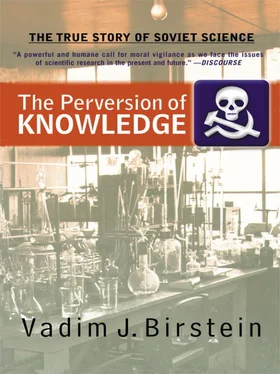Highly regarding the significance of Darwin’s theory, Marxist classicists at the same time indicated the errors allowed by Darwin. Darwin’s theory, appearing indisputably materialistic in its basic features, contains within itself a series of substantial errors…. It was a great blunder for Darwin to introduce reactionary Malthusian ideas into his theory of evolution…. At present it is quite intolerable to accept the erroneous parts of Darwinian theory…. So much the more intolerable is it to project the erroneous parts of Darwin’s doctrine as the foundation stone of Darwinism (I. I. Schmalhausen, B. M. Zavadovsky, P. M. Zhukovsky). 289
Lysenko returned to these names later. He accused Schmalhausen of introducing “formalistic, auto-mystical” theories that had “long been smashed by the progressive movement of advanced science.” 290Academician Zhukovsky became guilty of the acknowledgment “that the chromosome theory of heredity is freely offered from university platforms.” 291
The above-mentioned philosopher Mitin was even more aggressive toward Academician Schmalhausen. Mitin concluded: “…In effect, the methodology on which [Schmalhausen’s] book [ Factors of Evolution ] 292is built has nothing in common with dialectical materialism. This book is metaphysical and idealistic.” 293Both Lysenko and Mitin mentioned Professor Koltsov, who had already been dead for many years, as one of their main targets among “our native Mendelists-Morganists” who “share the chromosome theory of heredity, its Weismannist basis and idealistic conclusions in entirety.” 294Lysenko’s main ideologist, Prezent, a skilled demagogue, also attacked Schmalhausen: “As the fundamental principle in Schmalhausen’s pseudoscientific construction, it is Weismann’s autonomization of the organism…” 295
Mairanovsky’s colleague Sergei Muromtsev, a recently appointed full member of the Agricultural Academy, also got a chance to accuse the Mendelists-Morganists: “If the representatives of the Mendelist-Morganist school fail to understand the need for a creative approach to the solution of the problems facing biological science, if they fail to appreciate their responsibility to the field of practice, they will be left behind not only by socialist science, but also by the practice of socialist construction in this country.” 296
We know well in what field of “practical work” Muromtsev succeeded: the development of biological toxins for MGB assassinations. And Muromtsev’s personal experience of the “creative approach” was the labor of imprisoned scientists forced to work on biological poisonous agents. Muromtsev was especially outraged by Professor Iosif Rapoport’s defense of genetics at the session: “…We [the Michurinists-Lysenkoists] differ in principle as to method and general approach to the solution of scientific problems. And if you do not realize the difference, Professor Rapoport, your cytogenetic research will prove as sterile as the entire school of formal genetics.” 297
At the beginning of “Concluding Remarks” on August 7, 1948, Lysenko openly declared that he was a tool of the Party: “The Central Committee of the Party has examined my report and approved it.” 298The same day, Pravda published a letter from Yurii Zhdanov to Stalin in which Zhdanov confessed that he had been mistaken in his previous critique of Lysenko. 299In “Concluding Remarks,” Lysenko again condemned Academician Zhukovsky: “Academician P. M. Zhukovsky, as is worthy of a Mendelist-Morganist, cannot imagine a transmission of heredity characteristics without a transmission of chromosomes…. He cannot see the possibility of producing hybrids in plants by means of grafting; hence he cannot visualize the possibility of the inheritance of the acquired characteristics by plants and animals…” 300
Zhukovsky was devastated: As a Party member, he was expected to follow orders. And he followed them in contradiction to his professional knowledge: “I admit that I took an erroneous stand… I declare: I will fight—and sometimes I am very capable at it—for the Michurinist biological science…. I appeal to all Michurinists, among whom are both my friends and my foes, and declare that I will honestly fulfill all that I have stated here today…” 301
After these words, Academician Zhukovsky lost all credibility as a scientist. There were two more members of the Party who also cooperated: Corresponding Member of the Ukrainian Academy of Sciences Professor Ivan Polyakov and Moscow geneticist Sos Alikhanyan. 302A few months before the session, in his talk at the February 1948 conference at Moscow University, Professor Polyakov had discussed intraspecies competition as a basis of formation of new species. 303But this time he stated:
…One must make an absolute rupture with false views and resolutely criticize the metaphysical, idealistic, Weismannist views in the works of certain Soviet scientists. We must help our Party to expose this reactionary, pseudoscientific rot which is spread abroad by our enemies…. The Michurinist movement in science, led by T. D. Lysenko, is a broad and great national scientific movement, a movement which promotes a more rapid passage on the great path of the triumphant construction of Communist society… 304
However, these words did not win the sympathy of the Lysenkoist audience, and Polyakov’s speech was the only one at the session that was not followed by applause.
As for Alikhanyan, in the late 1930s he was appointed to the biology faculty of Moscow University without any training in biology. He lectured on genetic theory and was an activist in the Party organization. 305During World War II, he lost a leg. His renunciation at the August 1948 Session was especially undignified:
From tomorrow, I will begin to rid not only my own scientific activity of old, reactionary, Weismannist-Morganist views, but will also begin to remake, to break in two, all of my students and comrades…. I, for my part, categorically declare to my comrades that henceforth I will fight my adherents of yesterday who will not understand and join the Michurinist movement. I will not only criticize the vicious Weismannism-Morganism which appeared in my works, but will also take an active part in the progressive movement forward of Michurinist science. 306
The speech did not help. Like the other staff members of the Department of Genetics, Alikhanyan was dismissed after the August 1948 Session. But he fulfilled his promise, became a Lysenkoist, and even defended a doctoral dissertation on so-called vegetative hybridization in microorganisms. 307Several times he tried to become a corresponding member of the Armenian Academy and the USSR Academy. In the 1960s, he turned around and became a “normal” microbiologist again. From 1958, he headed the Laboratory of Genetics and Selection of Microorganisms at the Radiobiological Department of the Kurchatov Institute of Atomic Energy. I was a graduate student in that laboratory, and I met Dr. Alikhanyan frequently. Then, in the 1970s, he became director of the All-Union Research Institute of Genetics and Selection of Microorganisms (VNII Genetika) and professor in the Department of Genetics and Selection at Moscow State University. As director, Alikhanyan was a member of the Inter-Agency Commission that played an important role in the development of Soviet military biological programs. 308
The end of the August 1948 Session turned into the beginning of administrative actions against Lysenko’s numerous enemies. On August 27, 1948, Pravda published “A Letter to Stalin from the Presidium of the Academy of Sciences,” in which the Presidium promised “to rectify the errors we permitted, to reorganize the work of the Division of Biological Sciences [of the Academy] and its institutes, and to develop biological science in a true materialistic Michurinist direction.” 309The Presidium also reported on its recent actions: Secretary Academician Leon Orbeli had been dismissed and replaced by an enthusiastic supporter of Lysenko, Academician Ivan Oparin. Academician Schmalhausen was dismissed from his post as director of the Institute of Evolutionary Morphology. 310
Читать дальше











